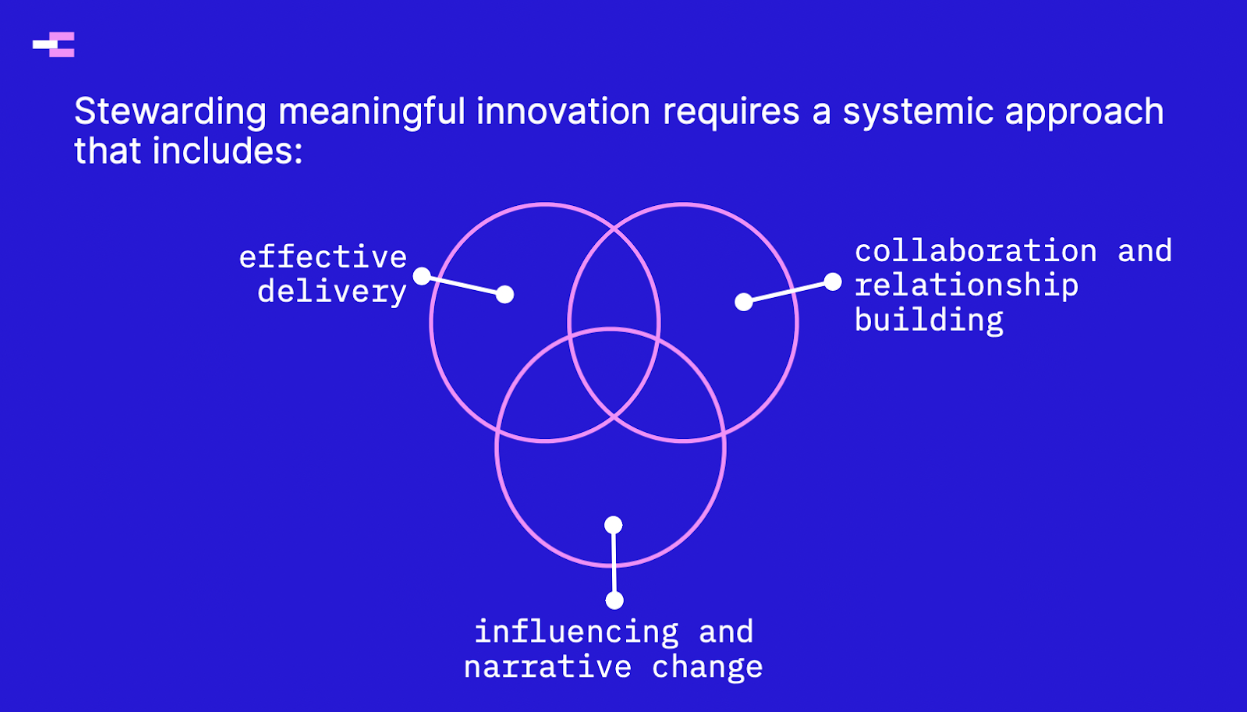Stewarding Meaningful Innovation
Engineering and stewardship for a sustainable, inclusive economy
Photo by Zamurovic Brothers from Noun Project
A foresight project delivered for the Royal Academy of Engineering by Careful Industries.
In November 2023 Careful Industries concluded a piece of foresight research to scope what it might look like if the Royal Academy of Engineering took a very specific approach to fostering innovation within engineering; we have mapped out what it might take for the Academy to become stewards for meaningful innovation in Engineering. Progressive future strategic development and cultural change are often what large organisations aspire to, and from our analysis, we proposed that a stewardship model is a key way to ensure such positive and fair future progress.
Engineering is a multifaceted domain of science and technology; it's represented by many organisations and institutions in many geographical domains, and the Royal Academy of Engineering plays a big role in promoting and supporting the development of Engineering within this wide context, both in the UK and globally. There is a level of complexity that any organisation involved in Engineering has to tackle. With this complexity in mind, the aim of our research was to identify pathways for meaningful innovation that ensure engineering plays a positive role in tackling major societal challenges in ways that empower society, communities, and individuals, and increase inclusivity and advance sustainability.
Our work provides some provocations about the role that the Royal Academy of Engineering might play in the wider innovation community and how the engineering practices of systems change and stewardship might expand and interact with other disciplines and sectors. This is a socio-technical challenge, which requires openness to cultural change. We used our research and Relational Foresight method to help us map out what this change should look like. Our six-stage research process included desk-based research such as horizon scanning and weak signals analysis, as well as multiple interactive workshops engaging a range of stakeholders through speculative worldbuilding and backcasting activities.
Becoming stewards of meaningful innovation
There are competing modes of innovation, including ‘Digital Disruption’, faith in exponential technological progress, and techno-optimism. Each is driven by different aims and values — some operate entirely within market conditions and others extend to influence political and power structures. To be successful, meaningful innovation must be adopted as a preferable approach both within engineering and in the wider innovation landscape.
The real-time backdrop to this piece of work is a broader policy and investment environment in which disruption and faith in the exponential growth and impacts of technologies have significant influence on narratives relating to and understanding of technological developments. Introducing meaningful innovation as a credible alternative requires narrative development, convening, and the creation of an evidence base. This “upstream” behaviour will lead to changes in both investment and policy development.
Adoption is a communication process in a social system.
Denning and Dunham, The Innovator’s Way (2010)
Diagram of a systematic approach to stewarding meaningful innovation
Meaningful innovation as a collaborative relational activity
Within some innovation paradigms, it is often presumed that technological interventions are sufficient: that progress is linear, and can be enabled by technological breakthroughs alone. But sociotechnical change is complex: people, money, power, and environmental events all have a part to play in the rollout and adoption of any new technology. These exogenous factors should not be regarded as secondary. Participation in, and engagement with, these non-technical domains is an essential for the success of any emerging technology or approach to innovation.
Meaningful innovation is socially engaged. Higher rates of adoption and roll-out of beneficial technologies requires navigating obstacles via a persistently outwards facing mode of engineering that:
Draws on domain expertise
Spots opportunities
Seeks to understand context and consequences
Shapes and is shaped by, social interactions
Stewardship and plurality
Shifting focus from a single perspective to the stewardship of many creates an opportunity for a more expansive and holistic approach to inclusion:
rather than simply striving to include more kinds of people within a single dominant ideology, it includes more ideologies within the conception of innovation.
This kind of inclusion allows for greater participation and, crucially, different potential models for success.
The adoption of a stewardship model will represent a significant cultural change within some parts of the innovation landscape; supporting this will require equitable governance and a commitment to sharing power and resources. This coexistence of differing priorities may lead to conflict between established and minoritised approaches, but — if well managed — it may also generate new approaches, skills, and methods. This is not a technological or innovation challenge, but a social and political one.
What actions need to be taken?
Whilst we worked with the Royal Academy of Engineering to identify recommendations that were specific to their strategic and programmatic framework, our research surfaced some more general reflections that are applicable to the broader Engineering and innovation landscape.
Power sharing and reparative redistribution
Strengthening the Engineering community's existing diversity and inclusion programmes and commitments, with a focus on building the resource, space, and status of multi- and inter-disciplinary experts from beyond engineering and from the Global Majority. The Peter Wall Institute for Advanced Study report Moving with Storms offers an example of interdisciplinary working organised to enable reparative redistribution.
Investment as a stewardship behaviour
We identified various intervention points where Engineering organisations can take a stewardship approach, for example in award-giving, investments and support for researchers, businesses and new technologies. This would involve not only awarding individual excellence or potential, but also (a) incentivising meaningful innovation through awards and other support programmes; and (b) attending to the field, spotting gaps, identifying second- and third-order unintended consequences and inter-relations so that missing inter- and multi-disciplinary working is encouraged, and under-represented perspectives are routinely and actively solicited.
Modelling stewardship
Leading by example can be impactful; Engineering organisations can use their convening power to initiate cross- and multi-sector projects and prizes that centre stewardship behaviours, and use networks and resources to actively support participation from those beyond their traditional networks. For instance, a “Meaningful Innovation Award” that mandated interdisciplinary working and attention to social impacts, or an “Engineering Stewardship Award” that encouraged collaboration between projects and programmes to mitigate unintended consequences and network effects.
Collaboration and relationship building
Leveraging existing networks is important to actively build interdisciplinary and cross-sector relationships, strengthening connections in and between communities and creating opportunities for new forms of collaboration.
Narrative reframing and storytelling
Stories of innovation tend to be heroic, but real change tends to be created by networks of people and communities. Within Science and Engineering there is a culture of medals, prizes, and fellowships, which still speaks to a “first past the post” conception of success. A broader approach to inclusion — one that includes and reflects many perspectives and ways of getting things done, and the importance of teams as well as individuals — can be sparked and reflected through inclusive storytelling and reframing of the work of innovation as a lone, heroic undertaking. Inspiring stories are a vital part of culture change, and reflecting an interest in stewardship is a vital part of this. See, for instance, the University of Sussex Future Natures programme.
To learn more about stewarding towards meaningful innovation, read the full report, Stewarding meaningful innovation: Engineering and stewardship for a sustainable, inclusive economy, on our website.
Find out more about our Consultancy and Foresight Services.
Credits:
Written by Anna Williams
Edited by Dominique Barron
Images by Tom McGrath and Zamurovic Brothers, Noun Project
Website by Aurélie Coulibaly




